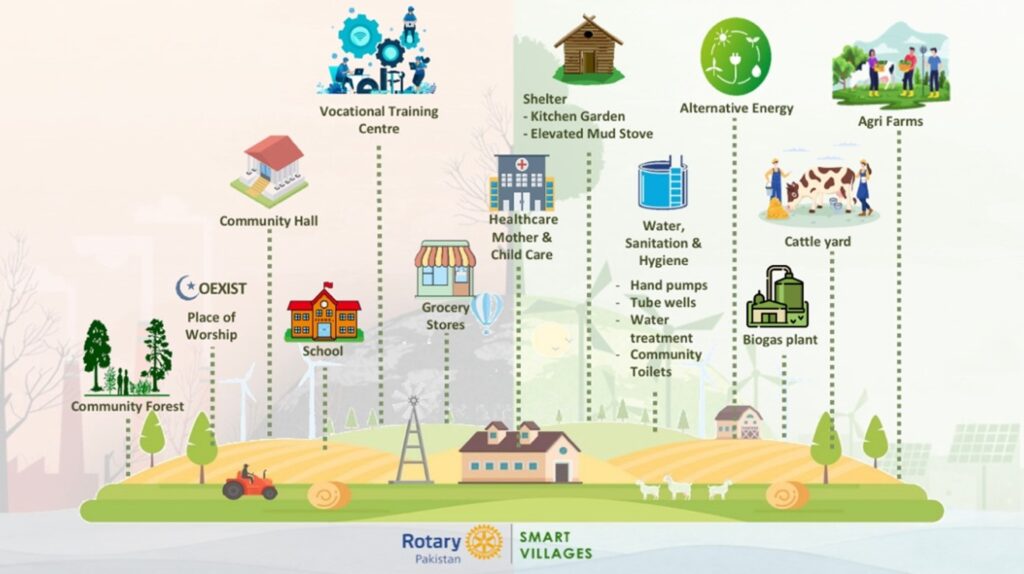Introduction
In September 2022, Pakistan bore witness to the relentless fury of nature as devastating floods wreaked havoc across the nation. Entire communities were left reeling from the destruction, their livelihoods submerged beneath a rising tide. It was in this darkest hour that Rotary International’s visionary response emerged – the Rotary Pakistan Smart Villages initiative. A beacon of hope, this program has undertaken the monumental task of reconstructing and revitalizing communities that were swept away by the torrents of climate change-induced disasters.
The Climate Change Challenge
Pakistan, a nation teeming with historical richness and cultural diversity, finds itself at a critical crossroads amidst the escalating global crisis of climate change. Across the world, humanity grapples with the dire consequences of environmental shifts and the increasing frequency of extreme weather events. Yet, Pakistan stands on the front lines of this profound challenge, facing unique and daunting climate change impacts. In recent years, the country has witnessed a series of alarming events, from devastating floods and prolonged droughts to erratic monsoon patterns. The melting glaciers of the Himalayas, a direct consequence of climate change, pose a dire threat to Pakistan’s delicate water resources, severely disrupting the foundation of its economy: agriculture. Simultaneously, rising temperatures amplify heat waves, endangering public health, while the ominous spectrum of sea-level rise looms over coastal communities. The floods of September 2022 stand as a stark reminder of the urgent need for adaptive measures.
The climate change challenge in Pakistan is further intensified by several critical factors. The nation’s heavy reliance on agriculture makes millions of livelihoods intricately linked to crop success, rendering it exceptionally vulnerable to shifts in weather patterns. Moreover, a substantial portion of the population resides in areas prone to devastating floods, exacerbating the risk of displacement and loss of livelihoods. The compounded challenge of water scarcity, driven by the accelerating melt of glaciers, magnifies the urgency for action.
Acknowledging the gravity of the situation, the Pakistani government has embarked on a comprehensive approach to address climate change. Established national policies and legal frameworks include the National Climate Change Policy and the Pakistan Climate Change Act of 2017. Initiatives complement these measures by strengthening disaster preparedness and response, improving water resource management, and advocating for the adoption of renewable energy sources. Despite notable progress, Pakistan faces formidable obstacles in its battle against climate change, including limited financial resources, infrastructure deficiencies, and political instability. Nevertheless, the nation’s unwavering resolve to confront this crisis remains steadfast, underscoring the imperative for collective efforts involving businesses, civil society, and individuals. Critical steps forward include investments in renewable energy, the adoption of efficient agricultural practices, and the development of climate-resilient infrastructure. Equally vital are education and awareness campaigns, empowering communities to adapt to the evolving climate conditions.
A Vision of Resilience:

Rotary Pakistan, under the leadership of Director Muhammad Faiz Kidwai, envisions a future where communities devastated by the ominous Spector of climate change not only rebuild but also flourish. At the heart of this vision lies the Rotary Pakistan Smart Villages program, a groundbreaking endeavor that redefines reconstruction by seamlessly integrating sustainable development and resilience-building in the face of environmental challenges.
Emphasizing that Rotary Pakistan Smart Villages goes beyond short-term goals; it’s built for enduring impact across generations. The program comprises two phases: the first reconstructs 20 villages hit hardest by the September 2022 floods. In the second phase, our scope extends beyond flood-affected areas, broadening our reach and impact.
In these villages, we’re introducing innovative construction techniques that utilize indigenous materials, such as bamboo, often referred to as “green steel” due to its environmental friendliness and sustainability. Every aspect of construction, from the choice of materials to the utilization of local craftsmanship, is a testament to the importance of preserving cultural heritage and minimizing environmental impact. These communities are not only rebuilding their homes but also reclaiming their heritage in harmony with nature.

In the heart of Rotary Pakistan Smart Villages lies a commitment to community empowerment. A participatory approach ensures that the residents are active partners in the project, allowing them to have a say in the design, planning, and management of their villages. This sense of ownership fosters a deep connection to their homes and a shared responsibility for their sustainability. The result is not just rebuilt homes but resilient communities. The participatory approach also guarantees the long-term sustainability of the program.
Furthermore, we commit to offering alternative energy sources such as solar, bio-gas, and wind power. These technologies not only reduce carbon emissions but also offer self-reliance and resilience in the face of energy challenges.
Beyond physical reconstruction, Rotary Pakistan Smart Villages aspires to transform communities by offering socio-economic development opportunities. This includes the establishment of schools, community centers, places of worship, access to clean drinking water, and improved sanitation facilities.
In essence, Rotary Pakistan Smart Villages is not just about rebuilding infrastructure; it’s about revitalizing communities, fortifying their resilience against climate change, and nurturing sustainable growth for a better tomorrow.
One of the prime objectives of Rotary Pakistan Smart Villages is to achieve zero carbon or minimum emissions in construction and daily living. Through the use of renewable energy sources, energy-efficient technologies, and sustainable waste management, these villages aim to become models of environmentally responsible living. This commitment to sustainability not only benefits the environment but also opens doors to carbon credits, providing vital resources for future projects.
In the wake of climate change-induced disasters, Rotary Pakistan Smart Villages stands as a testament to the power of innovation, resilience, and unwavering commitment to service. It is a beacon of hope, a symbol of transformation, and a glimpse into a future where communities not only rebuild but also thrive amidst the challenges of a changing climate. As the initiative continues to expand its reach, it lights the way forward for a Pakistan that faces adversity with innovation, sustainability, and empowered communities at its core.

Chaudhary Saifullah Ejaz
Chouhdary Saifullah Ejaz is President, CHIRAG Foundation, Pakistan and can be reached at saihur@gmail.com.






